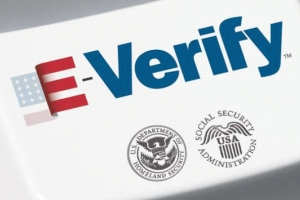
More states now require employers to use E-Verify to check work authorization status of new hires. (Photo: windley/flickr)
New state immigration laws took effect this week. These include Louisiana, Alabama, Georgia, South Carolina and Tennessee statutes which require employers to confirm that new hires have work authorization through E-Verify, a federal database that crosschecks employee information against the records of the U.S. Department of Homeland Security and the Social Security Administration. Opponents of E-Verify say it burdens immigrants because the database is prone to error.
In this election year, laws in Kansas, Rhode Island, Tennessee and Texas will require all voters to present photo IDs come November. Some of these laws are directly connected to the fear that non-citizen immigrants will vote in elections. A Tennessee statute will require election officials to compare the Voter Registration database with the Department of Safety database to ensure non-U.S. citizens aren’t registered to vote. If the database crosscheck reveals any discrepancies, these individuals must show citizenship papers.
On the other hand, California stands out in having a number of new laws which benefit the immigrant community.
California took the opposite stance of many states and made it illegal for municipalities to mandate that companies use E-Verify unless required by federal law.
AB 176 requires test sponsors of graduate exams such as GRE, LSAT, MCAT and GMAT to provide alternative methods for verifying a test taker’s identity. Newcomers who have yet to acquire driver’s licenses or other traditional forms of identification stand to benefit from this ordinance.
SB 126 makes it easier for farm workers, who are predominantly immigrants, to join unions and advocate for labor rights. Employers are prohibited from engaging in unfair labor practices such as preventing farm workers from holding a secret ballot election.
AB 353 prohibits impounding the vehicles of those stopped at sobriety checkpoints and found to be without a valid license.
SB 657 requires large retailers and manufacturers to inform consumers what steps have been taken to ensure that their supply chains are free from slavery and human trafficking which disproportionately victimizes immigrants.
The National Conference of State Legislatures reports that a wide range of laws in at least 21 states took effect on New Year’s Day. Many of these statutes affect the lives of the 37 million immigrants who call America home.
You can follow Erwin de Leon on Twitter or read his blog.
Feet in Two Worlds is supported by the New York Community Trust and the John S. and James L. Knight Foundation with additional support from the Mertz Gilmore Foundation and the Sirus Fund.


More states now require employers to use E-Verify to check work authorization status of new hires. (Photo: windley/flickr)
New state immigration laws took effect this week. These include Louisiana, Alabama, Georgia, South Carolina and Tennessee statutes which require employers to confirm that new hires have work authorization through E-Verify, a federal database that crosschecks employee information against the records of the U.S. Department of Homeland Security and the Social Security Administration. Opponents of E-Verify say it burdens immigrants because the database is prone to error.
In this election year, laws in Kansas, Rhode Island, Tennessee and Texas will require all voters to present photo IDs come November. Some of these laws are directly connected to the fear that non-citizen immigrants will vote in elections. A Tennessee statute will require election officials to compare the Voter Registration database with the Department of Safety database to ensure non-U.S. citizens aren’t registered to vote. If the database crosscheck reveals any discrepancies, these individuals must show citizenship papers.
On the other hand, California stands out in having a number of new laws which benefit the immigrant community.
California took the opposite stance of many states and made it illegal for municipalities to mandate that companies use E-Verify unless required by federal law.
AB 176 requires test sponsors of graduate exams such as GRE, LSAT, MCAT and GMAT to provide alternative methods for verifying a test taker’s identity. Newcomers who have yet to acquire driver’s licenses or other traditional forms of identification stand to benefit from this ordinance.
SB 126 makes it easier for farm workers, who are predominantly immigrants, to join unions and advocate for labor rights. Employers are prohibited from engaging in unfair labor practices such as preventing farm workers from holding a secret ballot election.
AB 353 prohibits impounding the vehicles of those stopped at sobriety checkpoints and found to be without a valid license.
SB 657 requires large retailers and manufacturers to inform consumers what steps have been taken to ensure that their supply chains are free from slavery and human trafficking which disproportionately victimizes immigrants.
The National Conference of State Legislatures reports that a wide range of laws in at least 21 states took effect on New Year’s Day. Many of these statutes affect the lives of the 37 million immigrants who call America home.
You can follow Erwin de Leon on Twitter or read his blog.
Feet in Two Worlds is supported by the New York Community Trust and the John S. and James L. Knight Foundation with additional support from the Mertz Gilmore Foundation and the Sirus Fund.
AboutErwin de Leon